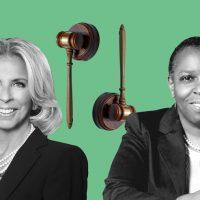Deputy Mayor Vicki Been is known for policy expertise, not political savvy.
Case in point: When she was asked in September 2019 whether property taxes would be reformed during the de Blasio administration, she answered honestly.
“I don’t know that that’s realistic. I think the foundation can be laid,” Been said. “Laying the foundation now makes it a topic that has to be front and center in the next mayoral election, and I think that’s really important.”
Her boss, Mayor Bill de Blasio, did not appreciate that. Been had to quickly walk back the statement. “The de Blasio administration is working to reform property taxes before we leave office,” she wrote to Crain’s.
Read more



The city in 2018 had created a reform commission, initially co-chaired by Been. It has yet to make final recommendations for the city and state legislatures, through which property tax changes must go.
De Blasio was asked about this unmet goal during an unrelated state Senate hearing last week. He claimed the idea of reviving the reform effort had just been discussed internally and promised final recommendations soon. On Monday he told NY1, “We’re going to have the final report out in the next few months.”
As with everything he failed to get done in 2020, de Blasio blames Covid. The pandemic apparently prevented the property tax commission from gathering feedback on the 72-page report it issued in January 2020. Never mind that community boards, agencies, judges and the rest of the universe have been holding hearings via Zoom for the better part of a year.
New Yorkers would have appreciated some Been-like honesty from de Blasio about why this has not happened with property taxes. It would have been refreshing to hear, “We screwed up,” or, better yet, “Sorry, my approval rating is not high enough to increase anyone’s property taxes.”
With all the means of communication these days, the reform commission has lots of ways to hear from New Yorkers other than its archaic plan for public gatherings in each borough. Having people schlep to a school auditorium and line up behind a microphone won’t make the recommendations any better or people any less upset when their taxes go up.
Besides, the commission has already held public hearings in every borough, plus three hearings with invited experts and two other public meetings. That’s 10 meetings. Its preliminary recommendations were mostly sensible but not new. Zoom will suffice from here on out.
No one denies that fixing property taxes will be hard, but this is the year to do it. De Blasio cannot seek re-election and has nothing to lose. Most City Council members also cannot run again, so they vote purely for the city’s benefit, not their own. And it’s an odd-numbered year, so state legislators are not on the ballot either. The stars are aligned.
Adding to the urgency, Affordable New York, a program that eliminates or reduces property taxes on new apartments for up to 35 years in much of the city, expires next year. Developers must start planning now to break ground then on desperately needed housing. They need to know what the tax regime will be.
Affordable New York, like 421a before it, is a workaround that is supposed to encourage apartment development but increases the price of land, which obviously does not help affordability. We need a tax system that does not depend on temporary carve-outs to get new housing built.
Making property tax reform even more imperative, the system is unfair to minorities, whose financial disadvantages got even worse when Covid hit. Pound for pound, rental housing is taxed more heavily than single-family homes that sell for millions, tens of millions, and even hundreds of millions of dollars. Tax reform is a way to keep rents down.
Moreover, houses in white areas have lower property taxes relative to their value than houses in places like Brownsville and the South Bronx. This is because assessment increases are capped at 6 percent per year (and 20 percent over five years) while home values in gentrified enclaves have risen much faster. De Blasio’s two Park Slope houses are commonly cited as examples, but there are far more egregious ones.
The list of problems with the system goes on from there. Virtually no one understands how their taxes are calculated or the rationale behind them. For instance, a co-op or condo is taxed based on what “comparable” units rent for, even though they are not rentals.
I used quotes because often the “comparable” units are anything but. Tax assessors don’t actually visit the apartments. How could they possibly know what units are similar?
Market-rate apartments are sometimes compared to rent-stabilized units, which gets especially absurd when ritzy Park Avenue co-ops are assessed. And no one can explain to Mrs. Jones why the taxes on her humble house in Ocean Hill are much higher relative to its value than the taxes on Ken Griffin’s $238 million penthouse.
The eventual reform is supposed to be revenue-neutral, meaning that the increases on some properties will be entirely offset by the decreases on others. This is supposed to make things easier for the politicians — “We’re not raising taxes,” they can say. Perhaps, but it will also pit winners against losers. That provision could be rethought.
It has been eight years since de Blasio made fixing property taxes part of his campaign for mayor. Covid was a bad excuse for stalling in 2020 and no excuse for all the other years. Reform needs to get done now, before another mayor takes office and creates another commission to kick the can down the road yet again.
